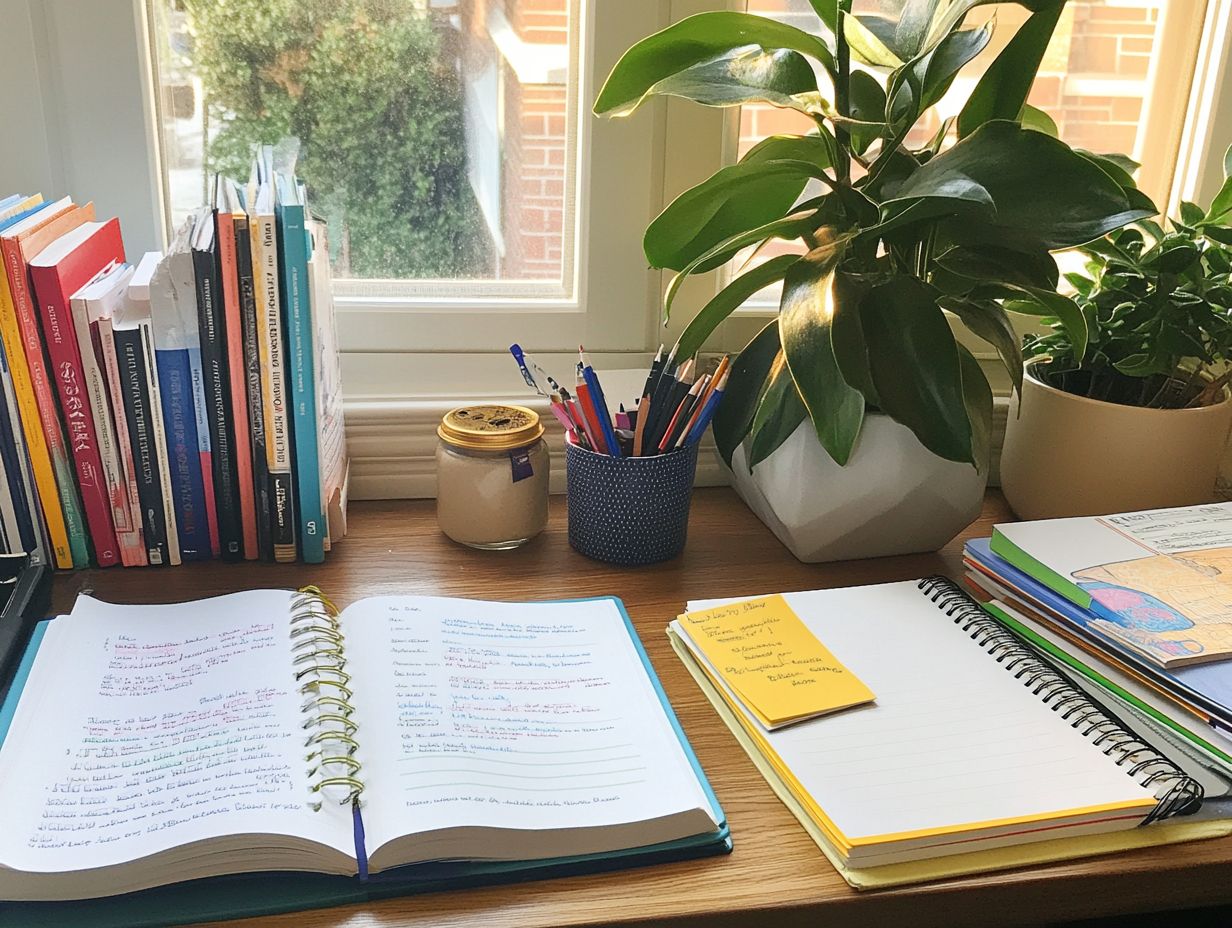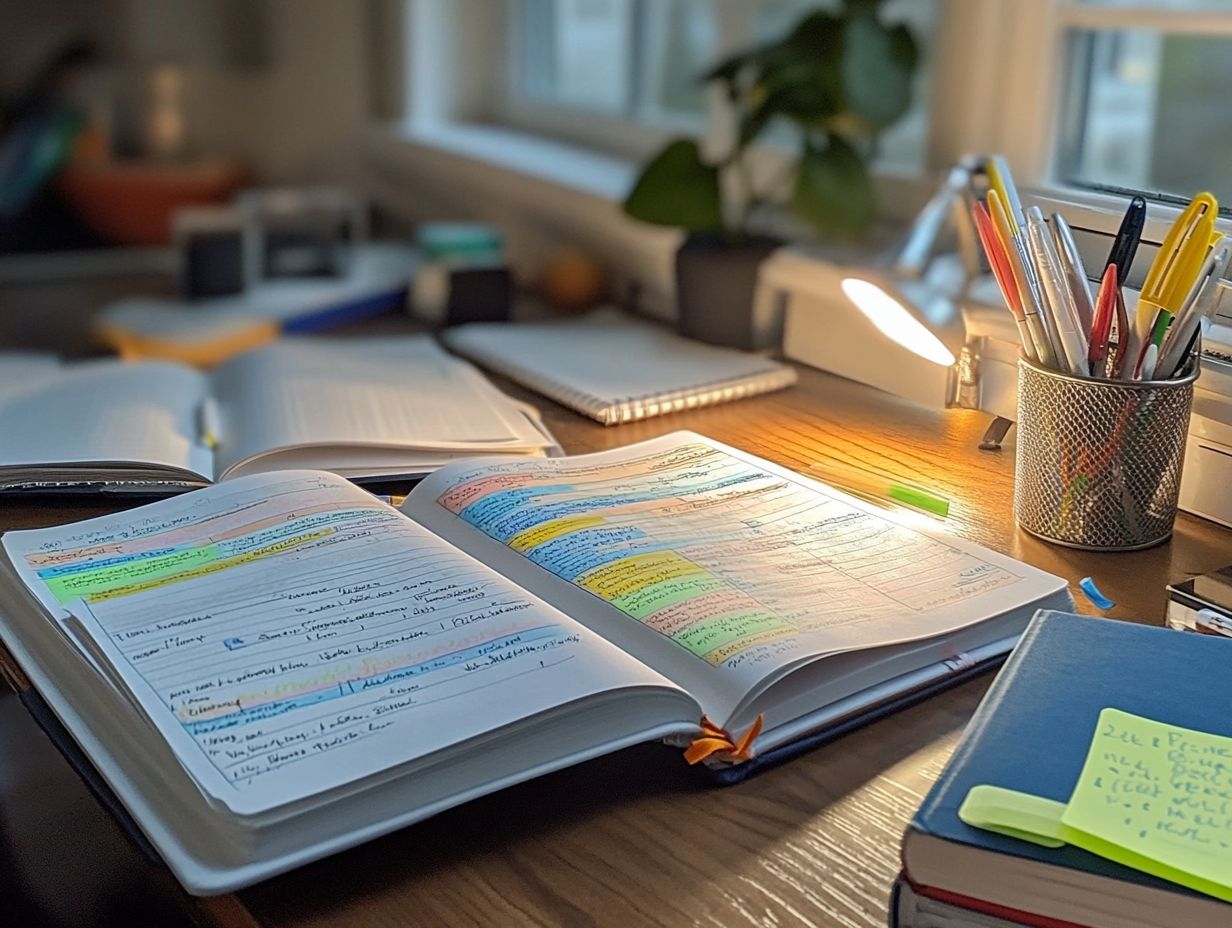how to find the right study materials for tests?
Studying for tests can feel like a daunting mountain to climb, but recognizing your unique learning style can truly elevate your preparation experience.
This guide is designed to assist you in identifying your preferred study methods, evaluating test formats, and leveraging valuable resources such as online materials and study groups. It also delves into the creation of an effective study plan, techniques for retaining information, and strategies to keep you motivated all of which empower you to tackle your exams with confidence and a positive mindset.
Engage with this guide to uncover tips that can revolutionize your study journey!
Contents
- Key Takeaways:
- Understanding Your Learning Style
- Assessing the Test Format and Content
- Utilizing Available Resources
- Online Materials, Textbooks, and Study Groups
- Creating an Effective Study Plan
- Strategies for Retaining Information
- Practice Makes Perfect
- Staying Motivated and Focused
- Preguntas Frecuentes
- Cu les son algunas estrategias para encontrar los materiales de estudio adecuados para los ex menes?
- C mo puedo determinar si un material de estudio es relevante y confiable?
- Cu les son algunos recursos gratuitos para encontrar materiales de estudio?
- Qu debo considerar al elegir materiales de estudio para un examen espec fico?
- C mo puedo sacar el m ximo provecho de mis materiales de estudio elegidos?
Key Takeaways:

Discover your learning style and find study methods that fit you perfectly. To optimize your preparation, consider the best study techniques for test prep by assessing the test format and content to tailor your study materials and focus on what is most important. Utilize various resources, such as online materials, textbooks, and study groups, to enhance your learning and understanding.
Understanding Your Learning Style
Understanding your learning style is essential for developing effective study habits that align with how you absorb and retain information.
By identifying whether you are a visual learner, auditory learner, or someone who learns best through hands-on activities, you can customize your study techniques to enhance your academic performance in college courses.
This tailored approach helps improve memory retention. It also enables you to manage your study environment more effectively.
Identifying Your Preferred Study Methods
Identifying your preferred study methods can significantly elevate your study skills and overall academic performance, ensuring you employ effective techniques that align with your unique learning style.
These methods can be diverse and adaptable. For instance, think of concept maps that visualize relationships between ideas or flashcards that sharpen your memorization and quick recall abilities.
Incorporating self-testing is a game changer. It allows you to assess your understanding of the material and boost retention.
Try out different strategies to find what really works for you! By tailoring these techniques to suit your individual preferences, you can cultivate a productive study environment whether you thrive on visual aids, hands-on practice, or verbal repetition.
By experimenting with different strategies, you can uncover the most effective combination that not only enhances your learning but also deepens your engagement with the subject matter.
Assessing the Test Format and Content
Assessing the test format and content is crucial for your study strategy. By doing so, you can prepare effectively for your exams and create a personalized study guide that aligns perfectly with the specific demands of your college classes.
This tailored approach enhances your understanding and boosts your confidence as you navigate your academic journey.
Knowing What to Expect on the Test
Knowing what to expect on the test can significantly alleviate your anxiety and elevate your confidence. This clarity allows you to channel your energy into effective exam preparation, focusing on targeted practice problems and the optimal use of study materials.
By reviewing past exams and sample questions, you can uncover valuable insights into the types of questions that may arise and familiarize yourself with the testing format and style. Use this knowledge to shape your study habits now and feel the difference!
Understanding the expectations of the test diminishes uncertainty and strategically guides your efforts toward practicing the most valuable problems. Ultimately, this thoughtful approach reinforces your knowledge and enhances your performance when it matters most on test day.
Utilizing Available Resources

Leveraging the resources at your disposal be it online materials, textbooks, or study groups can significantly enrich your learning experience. These diverse avenues not only reinforce your study habits but also help you cultivate effective study skills that will serve you well throughout your academic journey.
Start exploring these strategies today and turn your study sessions into a powerful tool for success!
Online Materials, Textbooks, and Study Groups
Online materials, textbooks, and study groups create a rich study environment that promotes collaborative learning. This approach enables you to engage actively with the content and refine your study habits.
These diverse resources weave together a vibrant tapestry of information, catering to your unique learning style and preferences. With online platforms at your fingertips, you can access videos, interactive quizzes, and forums designed to deepen your understanding.
Textbooks serve as essential tools, providing in-depth knowledge. Study groups offer a chance to share insights and tackle challenging concepts together. This interaction not only boosts your comprehension but also cultivates a sense of community.
Discussing ideas with friends makes learning lively and fun! By exploring different perspectives, you can significantly enhance your retention strategies, transforming the learning experience into something effective and enjoyable.
Creating an Effective Study Plan
Crafting an effective study plan requires mastering time management and prioritization. This enables you to take control of your schedule and allocate ample time to each subject.
Incorporating diverse study techniques enhances your learning outcomes and maximizes your academic potential.
Time Management and Prioritization
Effective time management and prioritization are crucial for a successful study schedule. By honing these skills, you can minimize distractions and enhance your study habits, leading to improved academic performance.
Try studying in focused bursts with breaks in between, a method known as the Pomodoro technique. This approach helps maintain your concentration and wards off burnout.
Time-blocking is a game-changer for organizing your study sessions. By designating specific time slots for each subject or task, you create a structured framework that keeps you on track.
When you prioritize tasks effectively, tackling high-impact assignments first can greatly boost your productivity.
Creating a distraction-free zone is essential for your success! Whether silencing notifications or seeking a quiet study space, ensuring the right atmosphere is vital for sustaining focus.
Strategies for Retaining Information
Implementing effective strategies for retaining information like memory techniques and self-testing can significantly enhance your ability to engage with the material and elevate your study routines.
Note-taking and Active Learning Techniques

Effective note-taking and active learning techniques, such as writing by hand, significantly enhance your comprehension and retention. These skills are essential for academic success.
Using methods like the Cornell method, you can organize information concisely while fostering critical thinking.
Digital tools provide flexibility, allowing you to access your notes from multiple devices. They also enable you to integrate multimedia elements seamlessly.
Reinforcing vocabulary and key concepts through summarization or teaching others greatly enhances your understanding. Active engagement solidifies your knowledge and boosts your confidence, preparing you for exams and real-world applications.
Practice Makes Perfect
Practice makes perfect! By utilizing practice tests and quizzes, you reinforce your knowledge and enhance your exam preparation.
This approach effectively evaluates your understanding and retention, ensuring you’re well-equipped for success.
Using Practice Tests and Quizzes
Practice tests and quizzes are effective self-testing tools that can skyrocket your confidence and preparedness for actual exams. They are essential study materials!
By including these assessments in your study routine, you can closely replicate real exam conditions and reduce anxiety on test day.
Establishing a schedule for regular practice sessions whether weekly or bi-weekly gives you ample opportunities to review and master the material.
Analyzing your quiz results helps pinpoint areas needing additional focus, fostering a deeper understanding of the subject.
Over time, this structured approach boosts retention and cultivates a sense of accomplishment.
Experiment with various formats like flashcards or online quizzes to keep your study process engaging and tailored to your learning style!
Staying Motivated and Focused
Staying motivated and focused can be a challenge for students, especially in a world filled with distractions. However, you can achieve remarkable improvements in your academic performance by cultivating a conducive study environment and employing effective strategies to manage test anxiety.
Dealing with Test Anxiety and Maintaining a Positive Mindset
Dealing with test anxiety and cultivating a positive mindset are essential for academic success. Include self-care and relaxation techniques in your routine. This will boost your focus and performance during exams!
To navigate this common challenge, explore various methods, such as mindfulness practices. These techniques encourage calmness and presence, alleviating overwhelming feelings on test day.
Deep breathing exercises are vital; they help center yourself and regulate your heart rate, fostering a sense of control when it matters most. Positive affirmations can work wonders, reinforcing your self-belief and resilience as you prepare.
A comprehensive self-care approach complete with adequate rest, balanced nutrition, and regular breaks is crucial in crafting a healthy study routine that supports your mental and emotional well-being.
Preguntas Frecuentes

Cu les son algunas estrategias para encontrar los materiales de estudio adecuados para los ex menes?
1. Comienza revisando el plan de estudios de tu curso o los temas del examen para determinar en qu material necesitas enfocarte.
2. Utiliza motores de b squeda en l nea para encontrar sitios web reputados que ofrezcan materiales de estudio para tu asignatura.
3. Habla con tus compa eros de clase o un tutor para obtener recomendaciones sobre materiales de estudio.
4. Revisa la biblioteca de tu escuela en busca de libros de texto, gu as de estudio o ex menes de pr ctica.
5. Busca foros en l nea o tablones de discusi n donde los estudiantes compartan sus propias notas o materiales de estudio.
6. Considera usar tarjetas de memoria o crear tus propias gu as de estudio para condensar la informaci n en un formato manejable.
C mo puedo determinar si un material de estudio es relevante y confiable?
1. Busca materiales que se alineen con los temas y conceptos delineados en el plan de estudios de tu curso.
2. Verifica la credibilidad de la fuente investigando al autor u organizaci n detr s del material.
3. Lee rese as o comentarios de otros estudiantes que hayan utilizado el material.
4. Considera la fecha de publicaci n: los materiales m s nuevos pueden ser m s relevantes y actualizados.
5. Usa m ltiples fuentes para verificar la informaci n y asegurar la precisi n.
6. Si es posible, consulta con tu instructor o un experto en la materia para obtener su recomendaci n sobre materiales de estudio confiables.
Cu les son algunos recursos gratuitos para encontrar materiales de estudio?
1. Muchas bibliotecas p blicas ofrecen acceso gratuito a bases de datos en l nea y libros electr nicos que pueden tener materiales de estudio relevantes.
2. Recursos educativos abiertos (OER) como Khan Academy y Coursera ofrecen cursos gratuitos y materiales de estudio para diversas asignaturas.
3. Algunas instituciones educativas tienen colecciones de materiales educativos a las que los estudiantes pueden acceder de forma gratuita.
4. Canales de YouTube educativos y podcasts ofrecen materiales de estudio para asignaturas espec ficas.
5. Verifica si tu escuela tiene un centro de tutor a entre pares o apoyo acad mico que ofrezca recursos de estudio para los estudiantes.
6. Foros en l nea y grupos de estudio comparten materiales de estudio gratuitos entre sus miembros.
Qu debo considerar al elegir materiales de estudio para un examen espec fico?
1. Determina el formato del examen (por ejemplo, opci n m ltiple, ensayo, respuesta corta) y busca materiales que se alineen con ese formato.
2. Ten en cuenta tu estilo de aprendizaje y elige materiales que se adapten a tu m todo preferido de estudio: visual, auditivo o pr ctico.
3. Considera el nivel de dificultad y el tiempo disponible para estudiar. Escoge materiales apropiados para tu nivel de habilidad.
4. Busca materiales que se centren en conceptos clave e informaci n que probablemente aparecer n en el examen.
5. Intenta acceder a ex menes de pr ctica o preguntas de muestra para familiarizarte con el formato y contenido del examen.
6. Conc ntrate en la calidad sobre la cantidad. Elige materiales que sean m s relevantes y tiles para tu examen espec fico.
C mo puedo sacar el m ximo provecho de mis materiales de estudio elegidos?
1. Usa una variedad de materiales para crear una comprensi n equilibrada de la materia.
2. Toma notas y participa activamente con el material en lugar de solo leer o ver pasivamente.
3. Divide tus sesiones de estudio en partes m s peque as y utiliza diferentes materiales para cada sesi n. Mant n las cosas interesantes!
4. Usa diferentes m todos de estudio como resumir, autoevaluarte o ense ar el material a otra persona.
5. No dudes en pedir ayuda! Si tienes dificultades para entender el material, consulta con tu instructor o un tutor para aclaraciones.
6. Revisa y practica regularmente con tus materiales de estudio elegidos para reforzar tu comprensi n y retenci n.






